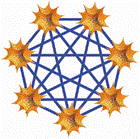SEM
Mathematica supercomputing at your desktop. Simple.


SEM (Supercomputing Engine for Mathematica) creates a standard way for each Mathematica kernel in the cluster to communicate directly with every other kernel. In contrast to typical grid implementations that are solely master-slave or server-client, all kernels communicate collectively in this solution by closely following the supercomputing industry-standard, Message-Passing Interface (MPI), and The Open MPI Project.
As a result of the collaboration between Advanced Cluster Systems, LLC (ACS) and Dauger Research, Inc., SEM enables Mathematica to be combined with Dauger Research's Pooch clustering technology. This fusion applies the parallel computing paradigm of today's supercomputers and Pooch technology to Mathematica.
Not only will the patent-pending SEM run on Linux and Macintosh
separately, but SEM will also utilize mixed clusters of Macintosh and
64-bit Linux.
Key Features
- Ease of programming parallel algorithms
- Exceptional parallel scalability by using Mathematica and SEM
- Less execution time needed for Mathematica algorithms
- Maximum utilization of resources in multi-CPU machines
- Symbolic manipulations across a cluster
- Distributed memory model for using the RAM of the entire cluster to run
memory-consuming applications
As they do for other cluster applications, Pooch and Open MPI provide the support infrastructure to enable this
supercomputing-style, parallel start-up, and inter-kernel communication. After locating, launching, and coordinating
Mathematica kernels on a cluster, SEM creates and supports an "all-to-all" communication topology,
which high-performance computing practitioners find necessary to address large problems in scientific computing,
all within the Mathematica computing environment.
SEM also provides an API that closely follows the MPI standard appropriate for use in Mathematica. By enabling
Mathematica kernels to be harnessed together in the manner that supercomputers are, Mathematica, Pooch, and Open MPI embark on a new approach to handling supercomputing challenges.
Product Support
SEM is developed and supported by Zvi Tannenbaum and Dr. Dean Dauger.
Registered users can contact Zvi Tannenbaum for updates.
Note: Commercial and educational licenses include 90 days of support. Contact the developers for additional support information.
About the Developers
Zvi Tannenbaum's passion for supercomputers led him to create Advanced Cluster Systems, LLC, in 2004. He co-founded and
cultivated Corelis, Inc., and Tasco Electronic Services. Throughout his 27 years in the electronic test industry, he has served
in many leadership positions in engineering, marketing, and business development, including as project manager, director of
operations, and director of manufacturing. Zvi has a degree in electronics from the Israeli Air Force Technical School
in Haifa, Israel.
Dr. Dean Dauger of Dauger Research, Inc., worked closely with ACS to design SEM. Dean E. Dauger holds a PhD in physics from UCLA, where his group created the first Mac cluster in 1998. Dr. Dauger has won multiple American Institute of Physics software contests, and he coauthored the original, award-winning Kai's Power Tools image-processing package for Adobe Photoshop.
SEM 1.2 requires Network Mathematica
7 or 8 and is available for Linux 64-bit and Mac OS X 10.4.11 and
up.
|